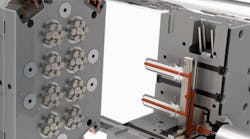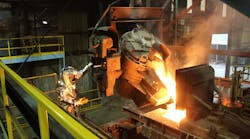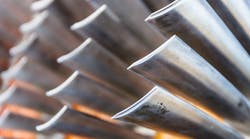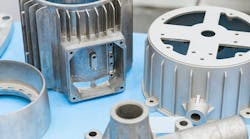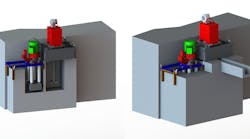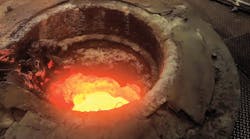Dynacast International, a diecaster based in Charlotte, NC, is adding metal injection molding (MIM) to its range of production processes. The company has 22 plants in 16 countries, and produces engineered components in aluminum, magnesium, and zinc alloys using conventional cold-chamber diecasting and conventional and multi-slide hot chamber diecasting processes.
Dynacast also offers “injected metal assembly.” Its customers range from the automotive, consumer electronics, and healthcare industries to hardware and computers and peripherals manufacturers, among others.
MIM involves mixing powdered metal with a binder material to compose a feedstock capable of being handled by injection molding equipment, which is normally used to form plastic parts. Injection molding allows complex parts to be shaped in a single operation and in high volume. The MIM process is defined by physical limits of the feedstock’s flow capabilities, which can limit the volumes of material injected, and thus the size of the finished products.
However, the MIM process is effective for delivering a “shot” to fill several cavities per mold, making it a good process for high-volume production of small, complex parts.
Dynacast explained that it has modified its proprietary multi-slide technology with a custom feeding system that it has optimized for the powder flow and thermal characteristics of MIM feed material.
“Our core tooling strategy includes molding many of the complex features complete, running multi-cavity tools in a smaller footprint, offering better alignment and improving consistency,” according to Dynacast.
The company added that its process achieves a “cycle time advantage” over other MIM producers, meaning it can at times produce more parts per minute using a single-cavity tool than others produce with a multi-cavity tool.
Dynacast said its MIM operation produces “small and even micro-size components, often with very complex geometries.” It claimed that adding MIM counts as an expansion of its manufacturing capabilities, and “strengthens its commitment to producing the highest quality, precision-engineered components for its customers.”
With MIM, Dynacast will be expanding its range of available metals too, to include “stainless steel, titanium, copper, and more.”
"We are delighted to be adding MIM to our service offerings," stated president and CEO Simon Newman. "This process is a natural fit for Dynacast, as it only sharpens our focus on providing small, complex components to our customers and it opens up a whole new market for us."

